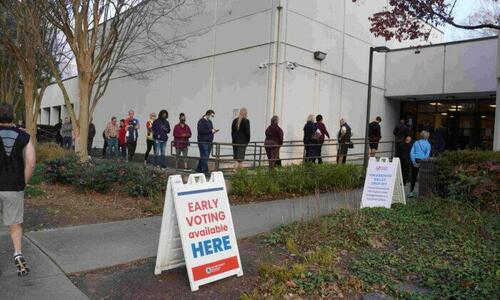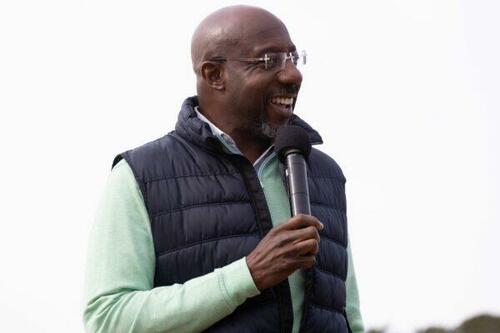"Just... Wow!": Record Numbers Turn Out For Early Voting In Georgia Senate Runoff
Authored by Dan M. Berger via The Epoch Times (emphasis ours),
Early voting in Georgia’s Senate runoff between incumbent Democrat Raphael Warnock and Republican Herschel Walker is setting records, as it did before the November general election.

More than half a million of the state’s 7 million active voters had already voted as the polls opened on Nov. 29.
“Just … Wow!” Georgia’s Deputy Secretary of State Gabriel Sterling posted on Twitter late on Nov. 28.
“Georgia voters, facilitated through the hard work of county election and poll workers, have shattered the old early vote turnout, with 300,438 Georgians casting their votes today. They blew up the old record of 233,000 votes in a day. Way to go voters and election workers.”

At the North Fulton County Annex in the Atlanta suburb of Sandy Springs, a line of waiting voters stretched out the front door, down the steps, and onto the sidewalk during four different visits by The Epoch Times to the building on Nov. 28 and Nov. 29.
A man who had just voted on Nov. 29 checked his watch and told The Epoch Times he’d waited about 45 minutes.
Early voting continues through Dec. 2. The runoff Election Day is next Tuesday, Dec. 6.
The closely watched, closely matched race will determine whether the Democrats get a 51-49 majority in the U.S. Senate or whether the chamber splits once more 50-50 between the two parties, with Vice President Kamala Harris as the tie-breaking vote.
In the previous Congress, Senate party leaders Chuck Schumer (D-N.Y.) and Mitch McConnell (R-Ky.) negotiated a power-sharing agreement in which the parties had equal representation on committees, but Democrats held the gavels.
Polls show the race is close. A Fabrizio/Anzalone poll of 500 likely voters from Nov. 11–17 had Warnock up by four points, still within the margin of error.
Another released on Nov. 28, done by FrederickPolls, Complete Digital, and AMMPolitical of 939 likely voters surveyed from Nov. 23–26, had the two tied at 50 percent each.

Georgia AARP said in a press release that Walker runs nine points ahead among voters aged 50 or older, who make up 62 percent of likely runoff voters. But other demographics showing strongly in early voting include female and black voters, who tend to favor Warnock.
The runoff was forced because while Warnock led in the general election, he failed to reach the 50 percent of the ballots required by Georgia law. He had 49.4 percent, Walker had 48.5, and Libertarian Chase Oliver had 2.1 percent.
There are clues to be taken out of the general election results.
Around one in 10 Republicans voted for Republican Brian Kemp for governor but crossed over to vote for Warnock or not vote in the Senate race at all.
Warnock was the Democrats’ leading vote-getter, well ahead of their gubernatorial candidate Stacey Abrams. Will those ticket-splitters come back for the runoff or just stay home? Will Oliver’s Libertarian voters come back? If so, who will they vote for?
Walker constitutes a wild card: a celebrity athlete who has never run for office, with huge name recognition in Georgia, but whom Warnock says is unprepared to represent the state.
Warnock has poured more than $100 million into ads attacking Walker over a number scandals—such as allegations of domestic violence, revelations about previously unacknowledged children born out of wedlock, and allegations about abortions the pro-life candidate allegedly paid for or solicited.
Warnock has aired ads featuring Republicans who say they can’t vote for Walker. Those who voted for Kemp and other Republicans running for statewide office—but for Warnock and not Walker—show there is a significant number.
But despite all this, poll numbers in Georgia have hardly moved since the summer. Warnock led narrowly during the summer and Walker in the fall, but always within the margin of error.
Democrats are pressing hard to lock in their base by getting them to vote early.
The party sued and won to get an extra day of early voting on Saturday, Nov. 26, after Secretary of State Brad Raffensperger, who had first said it would be allowed, then changed course and barred it, citing a passage in state election law.
Once permitted, it took place on a county-by-county basis. DeKalb was the only county in the state to start early voting before that, with one day on Nov. 23, the day before Thanksgiving. Some counties also opened the polls on Nov. 27.
After Nov. 28’s turnout, almost 504,000 Georgians had voted, either through early voting or returned absentee ballots, slightly more than 7 percent of the state’s approximately 7 million registered and active voters. About 468,000 used early voting, while around 36,000 absentee ballots had been returned.
In 11 counties—including DeKalb, the Atlanta metro area county that is the second largest in the state, more than 10 percent of voters had already voted.
Of early voters, about 244,000 were white and 193,000 black, with about 48,000 whose ethnicity was classified “other or unknown,” around 10,000 Hispanics, 8,000 Asian or Pacific Islanders, and a little more than 1,000 classified American Indian or Alaskan Native.
The state is about 57 percent white and 32 percent black, but blacks, who vote heavily Democrat, comprised 41 percent of those voting early.
https://ift.tt/E7oUdBl
from ZeroHedge News https://ift.tt/E7oUdBl
via IFTTT




0 comments
Post a Comment